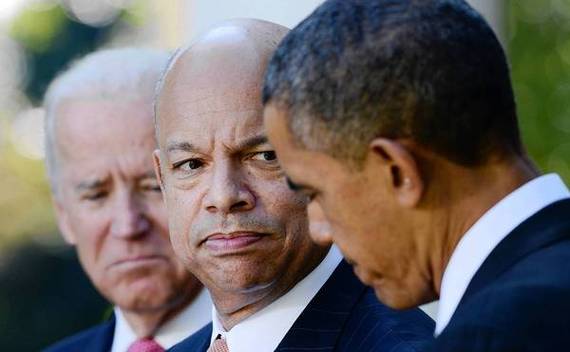When President Barack Obama, with Vice President Joseph Biden at the side of the stage, announced the resignation of Chuck Hagel as Defense Secretary on November 24, it came as a surprise to many people in the Washington, DC area. At the time of his nomination in early 2013, Hagel looked like the ideal pick for a risk-adverse Commander-in-Chief: a former Republican senator who could protect the president from charges of being weak on defense, a Vietnam veteran wounded twice in action, and a man who turned against the Iraq war on principle when most of his Republican colleagues continued to support it. Hagel was someone who was incredibly cautious before committing U.S. soldiers into hostile situations around the world -- precisely the viewpoint that President Obama, the anti-Iraq war candidate, would have found endearing in a Defense Secretary.
Over the past week, however, accounts from Politico, the New York Times, the Washington Post, Foreign Policy magazine, and The Hill have all tackled the question as to why Hagel decided to leave. Despite efforts by Pentagon Press Secretary Admiral John Kirby to paint the resignation as a normal process after an election year, no one believes the official reason given for Hagel's departure. Comments from anonymous administration officials tell a different story -- that of a Defense Secretary who didn't fit into the tight-knit national security decision making process of the Obama White House. Hagel, like his two predecessors at the Pentagon (Robert Gates and Leon Panetta), reportedly became frustrated by the administration's inability to arrive at a coherent and easily explicable Syria policy. He was tired of doing more at the Pentagon with less U.S. dollars. Quoted in the New York Times and Politico, White House officials bluntly said that the president lost confidence in Hagel as a manager who had the abilities to make good on the administration's wishes.
Aside from problems over management style, White House centralization and Syria policy, the Guantanamo Bay detention facility also happened to be a point of friction between Hagel and President Obama's team at the White House. It's the one George W. Bush-era national security issue that President Obama simply cannot get away from, nearly seven years after he signed his first series of Executive Orders that was supposed to close down the Gitmo prison for good. Needless to say, those efforts have failed abysmally, despite Obama's efforts to transfer detainees who have been cleared for release comments in public speeches throughout his presidency that Gitmo is a sieve that swallows taxpayer dollars for no discernible benefit. The detention facility remains open with 142 prisoners still in their cells.
Thanks to tough restrictions by Congress prohibiting any money from being used to transfer Guantanamo prisoners into America's maximum security prisons, the most President Obama can do is accelerate the transfers of prisoners who have determined to be low national security threats to the United States and at low risk of joining their old jihadist associates (Obama signed an Executive Order in 2011 that sets forth a review process to determine whether this standard can be met). The Obama administration has sent 13 detainees to other countries so far this year, including seven in the last three weeks.
The removal of Chuck Hagel from the Pentagon could provide the Obama administration with the last opportunity it has to speed up the closure process before the president has to leave in another two years. As SecDef, Hagel was so slow in certifying releases to Congress and facilitating the transfer of prisoners declared cleared -- so much so that National Security Adviser Susan Rice ordered Hagel to send a biweekly report to the president's desk outlining the status of the transfer process. With Hagel out of the way, the job of emptying out Gitmo could become less odious.
All of this, of course, is pure speculation until we know who is tapped as Obama's fourth Secretary of Defense in six years. Jeh Johnson, who was once the Pentagon's top lawyer and is held in high esteem by the administration's national security advisers, is rumored to be at the top of the shortlist. Like the administration at large, Johnson has been adamant about closing Gitmo permanently and has complained about congressionally-imposed restrictions in the past, describing them as unwise micromanagement.
"The executive branch, regardless of the administration in power," Johnson said at the Heritage Foundation in October 2011, "needs the flexibility, case by case, to make well-informed decisions about the best way to capture, detain and bring to justice suspected terrorists." Anything less, according to Johnson, makes Guantanamo even more controversial and divisive than it already is, all the while keeping the doors open to a detention facility that has proven to be a recruitment tool for Islamist extremist groups since January 2002.
If Johnson is nominated and confirmed as SecDef, he won't be able to circumvent the law. He will, however, be well placed to send low-risk prisoners in the pipeline to third-countries. That's about the best that the administration can hope for.

